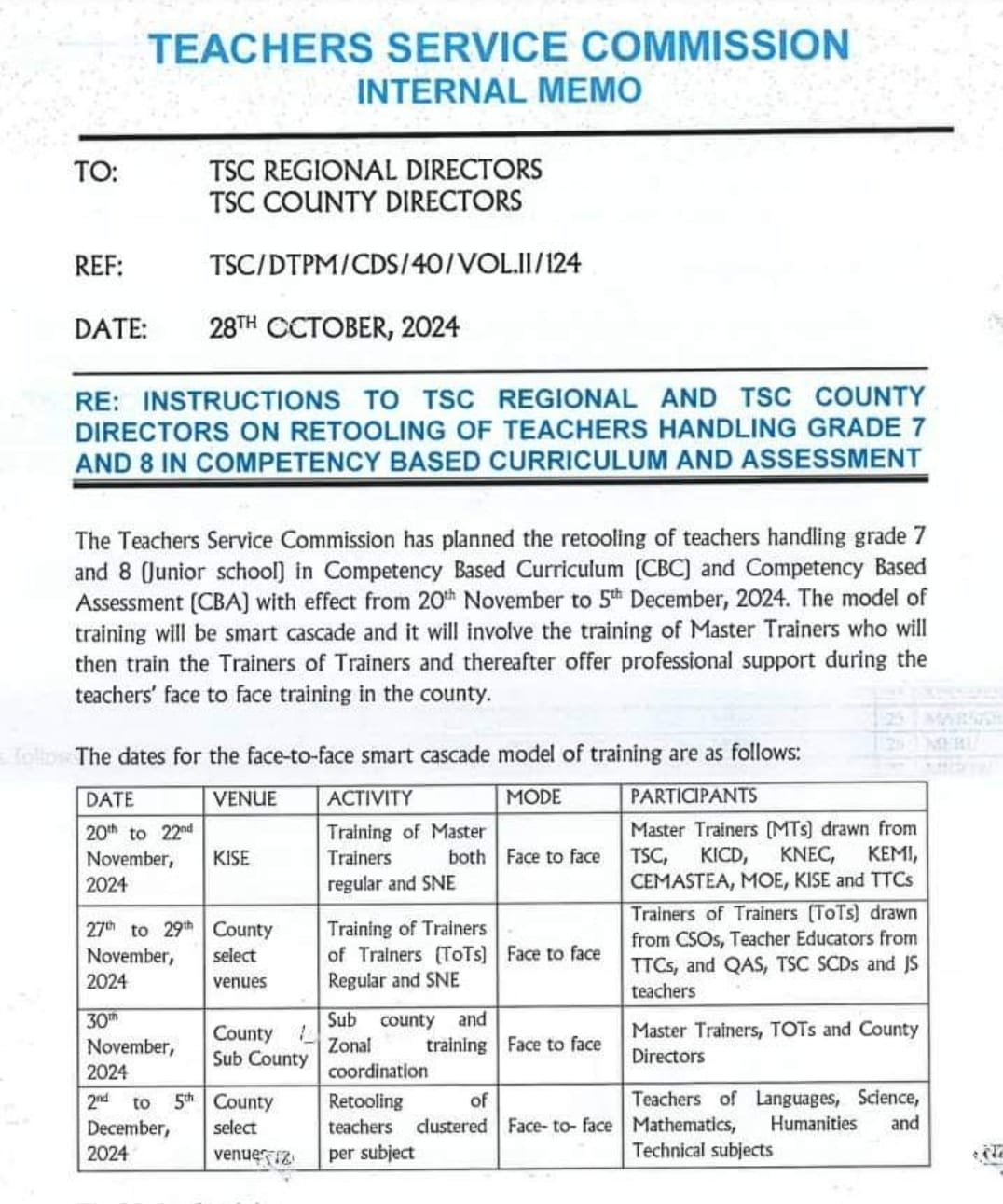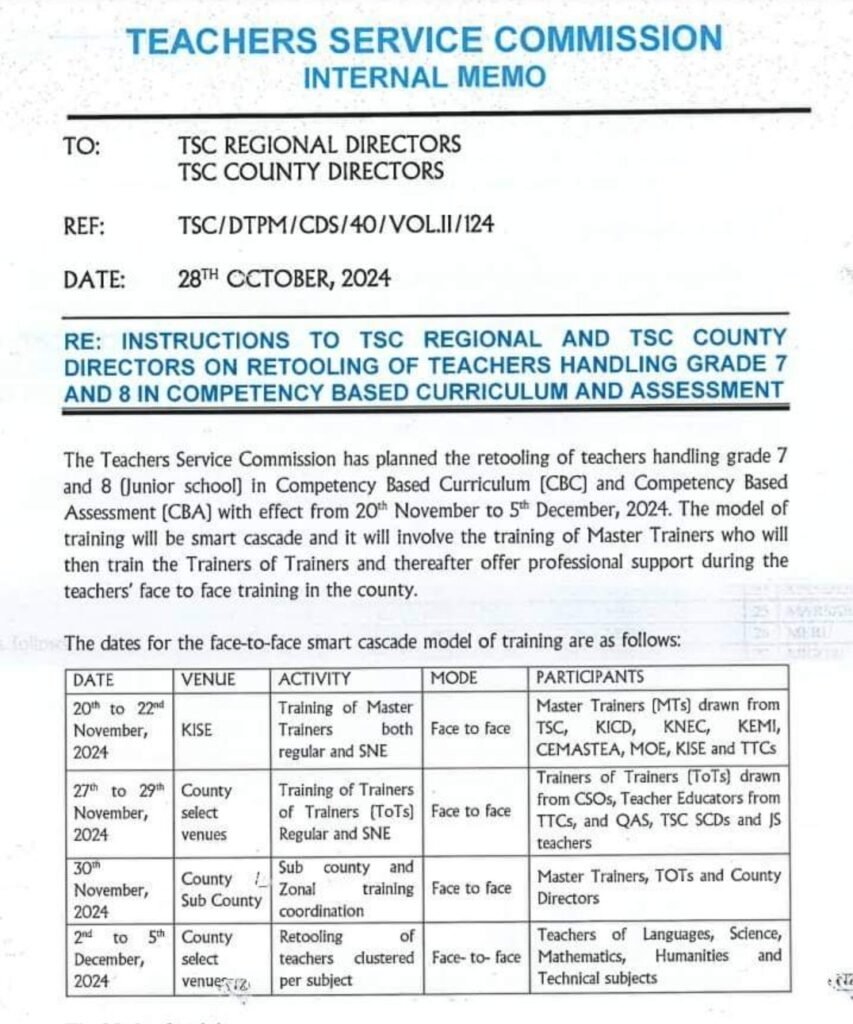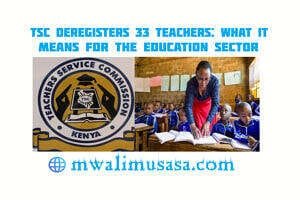North Eastern JSS Teachers to Receive Ksh 15,000 as the Rest Receive Ksh 3,800 Retooling Allowance: Key Details on the December Training for All Counties

TSC circular on JSS retooling

Introduction
The education sector in Kenya is poised for a significant enhancement with the introduction of a retooling training initiative for Junior Secondary School (JSS) teachers, scheduled from December 2nd to 5th, 2024. This training aims to equip educators with the necessary skills and knowledge to effectively transition into the evolving education framework. A focal point of this initiative is the designated financial support aimed at teachers, which varies notably between regions. Specifically, teachers from the North Eastern counties, including Garissa, Wajir, Mandera, and others, will receive a unique allowance of Ksh 15,000. This financial incentive is structured to acknowledge the unique challenges faced by educators in these areas, particularly in relation to resource accessibility and infrastructural constraints.
In contrast, educators from the remaining counties will benefit from a retooling allowance of Ksh 3,800. This disparity in funding underscores the commitment to tailor support according to regional needs, ensuring that all JSS teachers are adequately prepared for the upcoming academic challenges. Acknowledging the diverse landscape of educational environments, the distribution of these allowances reflects an understanding of the varying levels of support required by teachers across the nation.
The upcoming training and the related financial allocations not only aim to enhance the capabilities of JSS educators but also serve as a critical step towards improving the overall educational standards in Kenya. With the government’s concerted efforts, it is anticipated that this initiative will yield positive outcomes in teaching effectiveness, student engagement, and academic performance in the Junior Secondary School framework, thereby fostering an environment conducive to learning and development across all counties.
Significance of the Retooling Allowance for JSS Teachers
The retooling allowance for Junior Secondary School (JSS) teachers plays a crucial role in professional development and curriculum implementation. With the evolving educational landscape, it is imperative that educators are equipped with the necessary resources and training to effectively teach the new curriculum. The government of Kenya recognizes this need and has introduced the retooling allowance with the objective of enhancing the quality of education, particularly in underserved areas. This financial support, with Ksh 15,000 allocated to teachers in North Eastern regions and Ksh 3,800 for those in other counties, demonstrates a commitment to addressing disparities in educational resources and support.
By providing a substantial financial incentive, the government aims to motivate teachers to engage in continuous professional development. The retooling allowance serves not only as a means of financial support but also as a recognition of the vital role that teachers play in shaping the futures of their students. This recognition is particularly significant in regions that have historically been underserved, where teachers may face additional challenges in terms of resources and training opportunities.
Moreover, these allowances are reflective of a broader strategy to enhance teacher readiness and support the overall success of the new curriculum rollout. With proper training and support, JSS teachers can deliver high-quality education that meets the contemporary needs of students. As teachers become better equipped to handle diverse classroom situations, the quality of education is expected to improve, fostering a more conducive learning environment. Ultimately, the government’s commitment to enhancing educational resources through retooling allowances signifies an important step towards creating a more equitable and effective educational system in Kenya.
Regional Allowance Breakdown
The distribution of allowances for teachers across various counties reflects the unique challenges faced by those in remote locations. In December, teachers from the North Eastern region, specifically those in Garissa, Wajir, Mandera, Lamu, Marsabit, Isiolo, Samburu, and Turkana, will receive an allowance of Ksh 15,000. This amount significantly exceeds the Ksh 3,800 allocation granted to teachers in other counties. This disparity aims to address the increased logistical costs that educators in these areas encounter regularly.
Teaching in North Eastern counties often encompasses a wide array of difficulties, including inadequate access to educational materials, extended travel distances to reach schools, and a lack of infrastructural support. These factors contribute to a higher cost of living and increased operational expenses for educators. The Ksh 15,000 allowance serves as a recognition of these challenges, enabling teachers to better manage their financial commitments while delivering quality education to their students.
In contrast, the Ksh 3,800 allowance offered to teachers in other counties reflects a different set of regional circumstances. While these areas may also encounter unique challenges, they do not experience the same logistical burdens as those in the North Eastern region. The variance in allowances underscores the government’s commitment to ensuring that teachers are adequately supported based on their specific environments, thereby improving retention rates and overall job satisfaction.
Furthermore, this financial support mechanism aims to encourage qualified professionals to work in teaching positions within remote areas, where staffing shortages are often pronounced. By addressing the economic disparities, authorities can foster a more equitable educational landscape across the country. The differences in allowances signify a broader strategy to prioritize educational equity while recognizing the unique needs of teachers based on their geographical challenges.
Overview of the December Training Program
The upcoming training program for Junior Secondary School (JSS) teachers, scheduled from December 2nd to 5th, 2024, is designed to equip educators with essential skills and knowledge necessary for the effective implementation of the JSS curriculum. This initiative highlights the government’s commitment to enhancing the educational experience within the North Eastern region, evidenced by the significant Ksh 15,000 retooling allowance allocated to JSS teachers in contrast to the Ksh 3,800 offered to their counterparts in other counties. The differentiated allowances not only reflect the region’s unique challenges but also emphasize the crucial role of JSS educators in shaping future leaders.
The training program focuses on several key themes and skills pertinent to the current educational landscape. One of the primary objectives is curriculum retooling, which is imperative for teachers to adapt their instructional strategies in alignment with the updated educational guidelines. Participants will engage in workshops that cover practical classroom management techniques, innovative teaching methodologies, and the integration of technology in lessons, all aimed at fostering a more inclusive learning environment for students.
Select sessions will also emphasize the importance of continuous professional development, encouraging educators to reflect critically on their teaching practices and embrace innovative approaches to meet the diverse needs of learners. By focusing on skills such as differentiated instruction, assessment strategies, and effective communication, the training aims to prepare JSS teachers for the various challenges they may encounter in the classroom. Ultimately, this training program is a strategic move to ensure teachers are well-prepared to enhance the quality of education in the region, facilitating not only academic success but also holistic student development.
Preparing for the Training
As educators gear up for the upcoming training sessions scheduled for December, it is essential to approach these opportunities with adequate preparation. Teachers attending these sessions, particularly those from remote counties, should prioritize travel arrangements well in advance. It is recommended to investigate travel options, including public transportation or carpooling with fellow educators, to ensure timely arrival at the training venue. Those driving should also plan routes that avoid heavy traffic or inclement weather, allowing for a stress-free commute.
In addition to travel logistics, participants should compile a list of essential materials and documents for the training. The inclusion of a notepad, writing instruments, and personal electronic devices such as laptops or tablets will facilitate note-taking and resource access. Moreover, teachers are encouraged to bring any relevant curriculum guides or teaching aids, as these could serve as valuable discussion points during group activities.
Maximizing the training experience involves a proactive approach to networking and collaboration. Teachers should make it a point to interact with their peers from various counties, as this provides an opportunity to exchange insights and teaching methodologies. Engaging in discussions about new curriculum strategies can lead to innovative ideas that can be implemented in the classroom. Furthermore, being open to feedback and sharing personal best practices fosters a collaborative environment that enhances collective learning.
Lastly, educators should strive for an enthusiastic attitude towards the training objectives. Embracing a growth mindset will not only enrich their learning experience but also directly contribute to their professional development. By taking these steps, teachers will ensure they are well-prepared to tackle the challenges posed by the evolving educational landscape, ultimately benefiting their students and communities.
Long-term Implications for Teachers in ASAL Regions
The targeted financial allowance of Ksh 15,000 for teachers in North Eastern counties reflects a strategic initiative aimed at uplifting the educational standards in Arid and Semi-Arid Lands (ASAL). This increase is particularly significant considering the persistent challenges faced by educators in these regions, including limited resources and harsh environmental conditions. By providing higher allowances, the government is not only acknowledging these challenges but also incentivizing skilled professionals to remain in areas where their contributions are critically needed.
The introduction of enhanced training and skills development initiatives as part of this financial support can lead to profound long-term benefits for both teachers and students in ASAL regions. Teacher training programs can focus on equipping educators with modern teaching methodologies that cater to diverse learning needs, ultimately improving student engagement and comprehension. As teachers grow more proficient and confident in their teaching practices, students are likely to experience a higher quality of education, better learning outcomes, and increased motivation to pursue their academic goals.
Moreover, continuous government support could encourage retention of qualified teachers, reducing turnover rates that often hinder educational continuity. When experienced educators remain in these regions, they foster a stable learning environment that is essential for effective education. Such stability can result in building strong community ties, enhancing parental involvement, and promoting a culture that values education, thereby empowering students and elevating the local populace.
In conclusion, the provision of targeted allowances and ongoing training in North Eastern and other ASAL regions holds significant promise for advancing the educational landscape. By investing in teachers, the government not only boosts the immediate learning environment but also creates opportunities for sustainable development through education that benefits the broader community in Kenya.
Conclusion
In summary, the recent decision regarding the retooling allowance has ushered in significant changes for teachers, particularly benefiting those within the North Eastern counties. The allocation of Ksh 15,000 specifically for teachers in these regions stands in stark contrast to the Ksh 3,800 offered to educators throughout the rest of the country. This revised financial support aims to enhance the skills and capabilities of teachers, thereby positively impacting the quality of education delivered to students.
The upcoming training sessions scheduled for December are poised to be an invaluable opportunity for all teachers, regardless of the allowance variations. These sessions are designed to equip educators with the most current teaching methodologies and approaches, fostering an environment of continuous professional development. Given the significant investment in training and allowances, it is essential for teachers to remain informed about the specifics of the program and to actively participate in the training.
Preparation plays a crucial role in ensuring that educators can fully benefit from the retooling sessions. Teachers are encouraged to engage with their respective administrations to clarify any uncertainties regarding the training content or logistics. Moreover, staying connected with fellow educators can facilitate sharing of insights and experiences that may enhance the overall training experience.
In light of these developments, teachers are urged to embrace this initiative as an avenue for growth and advancement in their professional journey. By actively participating in the training and leveraging the resources provided, educators can significantly improve their teaching practices, ultimately enriching the educational landscape across the North Eastern counties and beyond.






